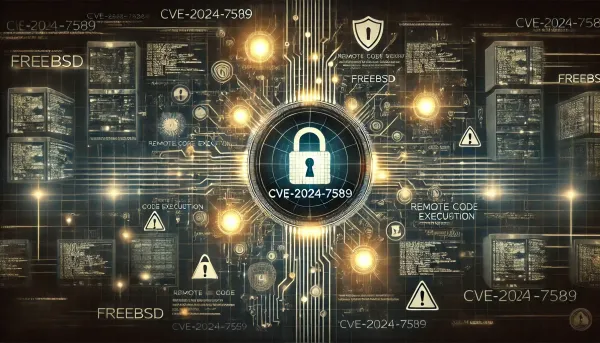
Critical Fix - FreeBSD OpenSSH CVE-2024-7589 Vulnerability
FreeBSD users are facing a significant security threat due to a newly discovered vulnerability in the OpenSSH implementation, tracked as CVE-2024-7589. This vulnerability, which could lead to unauthenticated remote code execution (RCE) with root privileges, is part of a broader issue referred to as “regreSSHion.” This blog post explores the technical details of CVE-2024-7589, its impact, mitigation strategies, and the lessons it offers for maintaining secure systems.
Background
OpenSSH is integral to the security of many Unix-like systems, including FreeBSD. It provides encrypted and authenticated transport for remote shell access and other services. Despite its widespread use and robust design, vulnerabilities can arise, particularly when new features are integrated into established systems. CVE-2024-7589 is an example of such a vulnerability, stemming from the integration of the blacklistd daemon with OpenSSH in FreeBSD.
Understanding RegreSSHion
The term “regreSSHion” refers to vulnerabilities that were reintroduced into OpenSSH after being previously resolved. This issue first came to light with CVE-2024-6387, a flaw caused by the reintroduction of unsafe code in OpenSSH. The re-emergence of these issues underscores the importance of continuous code review and the complexities involved in maintaining secure software.
CVE-2024-7589: A Detailed Analysis
The Vulnerability
CVE-2024-7589 affects all supported versions of FreeBSD. The root cause is a signal handler in the SSH daemon (sshd) that may invoke a logging function that is not async-signal-safe when a client fails to authenticate within the LoginGraceTime period (120 seconds by default). This leads to a race condition, potentially allowing an attacker to execute arbitrary code with root privileges.
Async-signal safety refers to the safety of functions called within a signal handler. If a function is not async-signal-safe, calling it within a signal handler can lead to unpredictable behavior, such as race conditions. In this case, the vulnerability is particularly dangerous because it occurs in the privileged context of sshd(8), which runs with full root privileges and is not sandboxed.
Exploitation and Impact
An attacker could exploit CVE-2024-7589 to execute code remotely and unauthenticated as root, leading to full system compromise. This could include installing malware, exfiltrating sensitive data, or establishing persistent access. The severity of this vulnerability is compounded by its high CVSS score of 7.4, reflecting the significant risk it poses to affected systems.
Mitigation and Response
Patching the Vulnerability
The most effective mitigation is to apply the security patches released by the FreeBSD Project. To patch your system, use the freebsd-update utility for binary updates or apply source code patches manually. After applying the updates, ensure that the sshd service is restarted to incorporate the fixes.
Temporary Workaround
If immediate patching is not possible, setting LoginGraceTime to 0 in the /etc/ssh/sshd_config file and restarting sshd can mitigate the risk. This workaround disables the vulnerable signal handler but exposes the system to potential denial-of-service (DoS) attacks by terminating unauthenticated connections immediately. While not ideal, this approach offers a temporary safeguard against remote code execution until a proper patch can be applied.
Additional Considerations
Beyond the immediate mitigation, it’s important to consider long-term strategies to avoid similar issues:
-
Enhanced Code Review Processes: The reintroduction of vulnerabilities like those in the regreSSHion series highlights the need for rigorous code review processes, especially when integrating new features or third-party components.
-
System Monitoring and Logging: Continuous monitoring of sshd logs and system behavior can help detect early signs of exploitation attempts. Implementing intrusion detection systems (IDS) or intrusion prevention systems (IPS) can provide an additional layer of security.
-
Regular Security Audits: Regularly scheduled security audits can help identify potential vulnerabilities before they are exploited. These audits should include both automated tools and manual review processes to ensure comprehensive coverage.
-
User Awareness and Training: Administrators should be trained to recognize and respond to potential security issues, including the importance of prompt patching and system hardening practices.
The Broader Implications of CVE-2024-7589
Open Source Security Challenges
The discovery of CVE-2024-7589 underscores the challenges inherent in maintaining secure open-source software. Open-source projects rely heavily on community contributions, which, while beneficial, can also lead to inconsistencies in code quality and security. The reintroduction of previously resolved vulnerabilities in OpenSSH highlights the need for continuous security assessments and better integration practices.
Future Directions for OpenSSH
Given the recurring issues with async-signal safety in OpenSSH, there is a growing discussion within the community about re-architecting parts of the software to improve its security posture. This could involve more extensive use of sandboxing, as well as stricter guidelines for code contributions and integration of third-party components like blacklistd.
Implications for System Administrators
For system administrators, the lessons from CVE-2024-7589 are clear: always stay current with security patches, conduct regular system audits, and understand the underlying vulnerabilities in the software you deploy. Administrators should also advocate for and participate in broader security initiatives within their organizations to ensure that best practices are followed consistently.
Conclusion
CVE-2024-7589 represents a critical threat to FreeBSD systems, particularly due to its potential for unauthenticated remote code execution with root privileges. While patches are available, the broader lessons from this vulnerability stress the importance of continuous vigilance, robust security practices, and the need for ongoing improvements in how we secure open-source software.
For those managing FreeBSD environments, swift action is necessary—either by applying the patches or implementing temporary workarounds. The stakes are high, and proactive security measures are essential to mitigate the risks posed by this and future vulnerabilities.